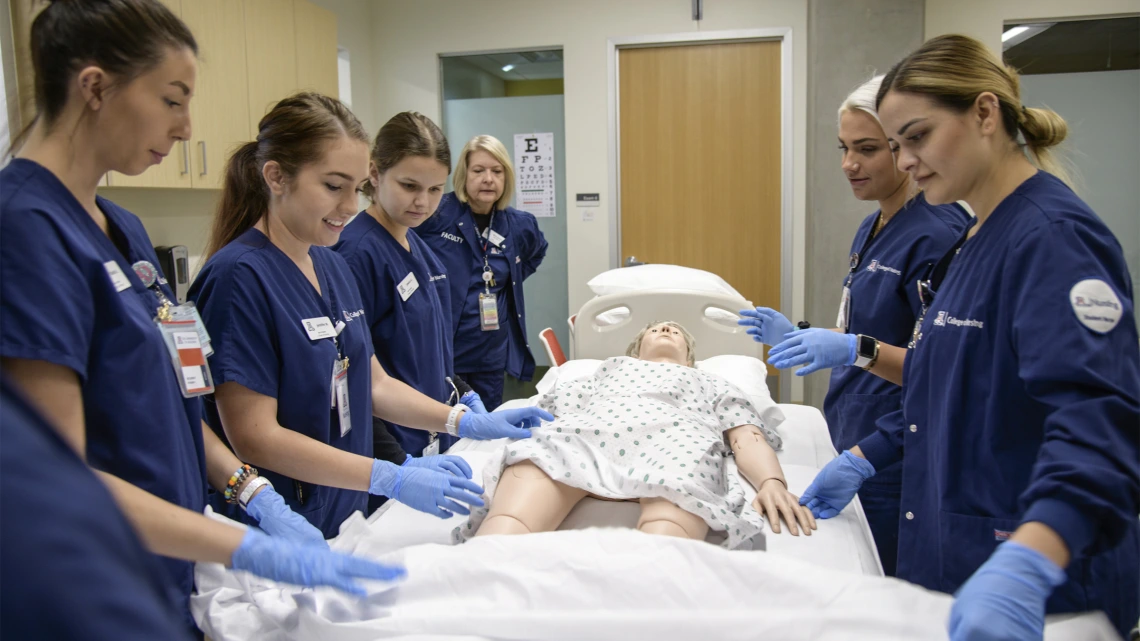Nursing Simulation Upgrades to Boost In-Person, Remote Learning
Alumni donation will provide $1 million to support online training and enhance nursing education.

University of Arizona nursing students simulate patient care with a manikin at the College of Nursing in Gilbert, Ariz. in 2019.
The University of Arizona College of Nursing is poised to make significant improvements to its simulation facilities to provide students greater access to next-generation education.
University of Arizona alumni Andrew and Kirsten Braccia have made a generous $1.5 million gift to the university, $1 million of which is designated for the College of Nursing.
The Braccia’s gift will enhance simulation capabilities at the college’s Tucson, Phoenix and Gilbert campuses, and provide students online access to virtual-patient experiences. Nursing students regularly engage in team-based clinical procedures under the direction of faculty members and simulation specialists. This technology gives future nurses opportunities to receive live feedback while training in realistic and complex scenarios.
Tomorrow’s technology for today’s students
Steve Machtley, assistant dean for Learning and Healthcare Technology Innovations, said the purchases from the Braccias’ gift to the college fall into three broad categories: software subscriptions, upgrades to its simulation facilities, and equipment and other essential technology to support online teaching and learning due to the COVID-19 pandemic.

Nursing students observe one another during a simulated learning exercise.
Under Machtley’s guidance, and in coordination with faculty, the College of Nursing will subscribe to online software solutions that offer virtual patient encounters designed to supplement or replace a student’s experience in an in-person simulation center or patient-care setting. The simulations will present students with realistic clinical scenarios in an interactive environment to help them understand the case, practice skills and make sound decisions.
“We are purchasing virtual-reality equipment to provide our students the opportunity to experience some of these simulated patient encounters with even greater immersion,” Machtley said. “We have a vision of incorporating extended reality learning experiences throughout our curriculum, so this wonderful gift enables us to move forward in that direction.”
The gift also will support much-needed enhancements to College of Nursing simulation facilities. The Steele Innovative Simulated Learning Center in Tucson will launch phase one of its planned renovation. Updates include replacement of core audiovisual technology and integration with the UArizona Health Sciences clinical simulation management platform used in the Health Sciences Innovation Building. Together, these improvements will provide live remote monitoring and video capture of simulation activities for enhanced debrief and student learning.

College of Nursing in Gilbert, Ariz.
At the college’s new Gilbert campus, funds will be used to expand and improve functionality within its simulation rooms to support program growth. In addition, both the Phoenix Biomedical and Gilbert campuses will receive new high-fidelity pediatric manikins.
Another important goal of the Braccia’s gift to the College of Nursing is to support and augment technology needed for distance learning due to the pandemic. These include “smart health equipment” like Bluetooth stethoscopes that will be incorporated into telehealth simulations, video production kits for faculty to produce skills-training demonstrations and audiovisual equipment to support remote access to classroom sessions for students who need to isolate themselves from others after the return to campus.
Ensuring continued educational success
“I am deeply grateful for the generous gift that Andrew and Kirsten made to the College of Nursing to ensure the continued success of our students during this challenging time,” said Nursing Dean Ida M. “Ki” Moore, PhD, RN, FAAN. “It has been my pleasure to learn about the Braccia’s priorities for moving the College of Nursing forward in an era where state-of-the-art technology will most certainly be center stage. We are already seeing the positive impact of their gift on our students’ ability to engage in virtual and web-based simulations that for the immediate future will replace ‘on-ground’ experiences.”
Andrew and Kirsten Braccia live in the San Francisco area with their four children. A proud Wildcat Nurse for Life, Kirsten Braccia graduated from the College of Nursing and worked as a registered nurse at the Lucile Packard Children's Hospital on the Stanford University campus. Andrew Braccia, an alum of the Eller College of Management, is a venture capitalist with Accel.

